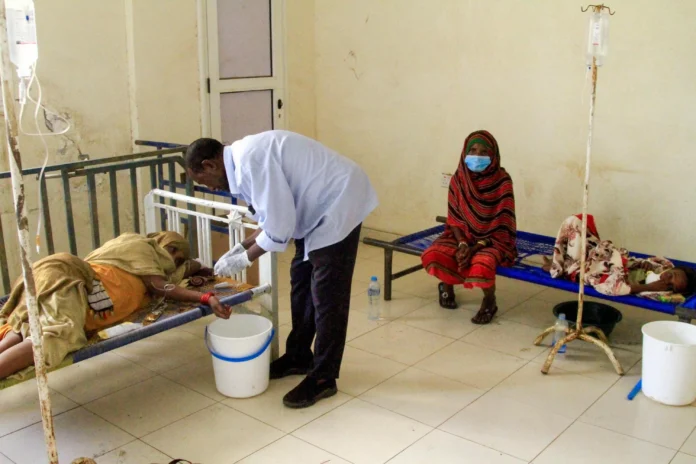Dozens of people have lost their lives and hundreds more are suffering from a deadly cholera outbreak in war-torn Sudan, according to the country’s Health Ministry. The situation has raised concerns among health officials and aid organizations, as the country is already struggling with a humanitarian crisis due to ongoing conflicts.
Health Minister Haitham Mohamed Ibrahim announced on Sunday that a total of 55 people have died from the disease and over 350 others have been hospitalized. The outbreak has been reported in several states, including Blue Nile, White Nile, Gezira, Sennar, and the capital city Khartoum.
Cholera is a highly contagious bacterial infection that causes severe diarrhea and dehydration, and if left untreated, can lead to death within hours. The disease is primarily spread through contaminated water and food, making it a major threat in areas with poor sanitation and limited access to clean water.
The ongoing conflict in Sudan has severely impacted the country’s infrastructure, including its healthcare system. The lack of clean water, proper sanitation, and medical supplies has made it challenging to contain the spread of the disease.
The situation is particularly dire for those living in internally displaced persons (IDP) camps, where overcrowding and poor living conditions make it easier for the disease to spread. The majority of the affected individuals are women and children, who are already vulnerable due to the ongoing conflict.
In response to the outbreak, the Health Ministry has set up treatment centers and deployed medical teams to the affected areas. They are also working closely with international organizations, such as the World Health Organization (WHO) and UNICEF, to provide aid and support in containing the outbreak.
The WHO has also provided the country with oral cholera vaccines to help prevent the spread of the disease. However, due to the ongoing conflict and limited resources, it has been challenging to reach all the affected populations.
The outbreak is a grim reminder of the dire situation in Sudan, where millions of people are in need of humanitarian assistance. The country has been in a state of crisis since 2011, when the South Sudanese Civil War broke out, leading to widespread displacement and economic instability.
The conflict has resulted in the displacement of over 2.5 million people, with many living in IDP camps and facing food insecurity and limited access to healthcare. The recent cholera outbreak has only added to their suffering and highlights the urgent need for a resolution to the conflict.
In the face of such adversity, it is heartening to see the tireless efforts of the health workers and aid organizations in responding to the outbreak. Their determination and dedication to saving lives in the midst of a war-torn country is truly admirable.
It is also a reminder of the importance of investing in healthcare and infrastructure in conflict-affected areas. Proper sanitation and access to clean water are essential in preventing the spread of diseases like cholera, and it is crucial to address these issues to protect the health and well-being of the population.
In the meantime, it is imperative that the international community steps up its support and aid to Sudan. The country’s health system is in dire need of resources and assistance to effectively respond to the outbreak and prevent further loss of life.
The people of Sudan have endured years of conflict and suffering, and it is time for us to come together and support them in their time of need. Let us not forget the thousands of lives lost and the millions who continue to suffer in silence. It is our responsibility to act now and make a positive impact in the lives of those affected by this devastating cholera outbreak in Sudan.


